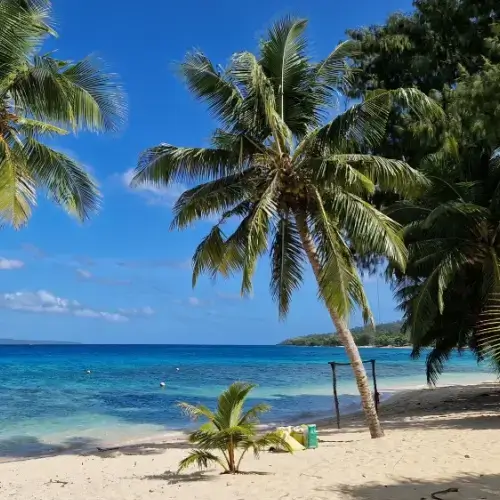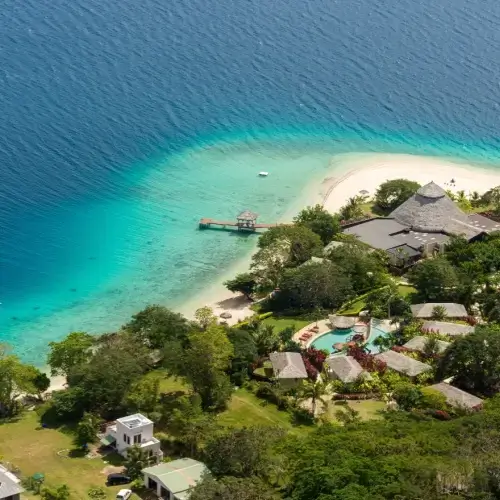Home / Compare Travel Insurance / Travel insurance for Van…
Travel insurance for Vanuatu
Planning a trip to Vanuatu? Compare travel insurance quotes to cover your trip for less






Key takeaways
- By getting travel insurance, you can travel with confidence and have peace of mind while on your adventure.
- Vanuatu is a fairly safe place to visit, but you can’t always avoid petty theft, rolled ankles or cyclones – that’s why travel insurance covers the unexpected.
- The inclusions and exclusions of a policy will vary depending on the insurer, level of cover and type of policy you choose.
Expert tips for getting travel insurance for Vanuatu
If you’re planning on jetting off to the Pacific, check out our travel insurance expert Adrian Taylor’s top tips for getting travel insurance for your journey.

Consider comprehensive travel insurance
We recommend you purchase a comprehensive travel insurance policy as soon as you pay any deposits or make a booking for your holiday. This ensures you’re covered for trip cancellations if an unexpected event requires you to cancel your journey, as well the cost of any unexpected medical emergencies and more.
Declare your pre-existing medical conditions
If you have any pre-existing medical conditions, search for policies that allow you to declare these conditions as part of your application to your chosen insurer. That way, you can discuss with your insurer whether you’ll have the cover you need and, if possible, choose a policy that’ll cover you if you’re injured or become ill overseas.
Compare travel insurance quotes
By comparing different travel insurance offers, you can search for a policy that matches your budget and your itinerary. Consider what limits you need on luggage, activities, medical expenses and more before choosing your policy. With Compare the Market’s online comparison tool, you can compare different policies from different providers all in one place. Simples!
Do I need travel insurance for Vanuatu?
 While a perfect holiday is what we all want when we book our flights, things don’t always go as planned. Perhaps you accidentally scrape your leg on coral and develop a severe infection or twist your ankle while walking along the boardwalk of Port Vila.
While a perfect holiday is what we all want when we book our flights, things don’t always go as planned. Perhaps you accidentally scrape your leg on coral and develop a severe infection or twist your ankle while walking along the boardwalk of Port Vila.
Getting medical attention in a foreign country can be difficult and expensive, which is why travel insurance for Vanuatu is a great way to give yourself peace of mind and protect yourself from the unexpected. Not only that, but depending on your policy, other benefits that come with travel insurance can financially protect you against cancellations, theft and more.
What should my travel insurance for Vanuatu include?
When looking for international travel insurance cover, consider a comprehensive policy that covers your activities, belongings and health. You can check the Product Disclosure Statement (PDS) provided by your travel insurance provider to ensure you have the level of cover you need. Read the Target Market Determination (TMD) for information on whether a policy is right for you.
Cover for medical expenses and 24/7 assistance
Australia doesn’t have a Reciprocal Health Care Agreement with Vanuatu, meaning without travel cover, any medical costs you incur there will come out of your own pocket. Travel insurance may cover the costs of unexpected medical bills, not just for accidental injury but also illnesses, emergency medical evacuation and even repatriation, should it be necessary. With 24/7 emergency assistance as part of your policy, this feature can come in handy on your holiday should something go wrong.
Cover for theft and loss of belongings
If your luggage or personal belongings are lost or stolen, depending on your policy, your insurer may reimburse you for the losses up to the amount specified on your policy’s PDS. In most cases, an excess will apply to all claims.
Personal belongings can include cameras, wallets, cash, credit cards and jewellery. Most policies will have limits on certain categories of items – another good reason to review the PDS of your chosen insurer.
Cancellation and delay cover
Airlines will usually compensate passengers if your flights are delayed or cancelled. However, when the airline doesn’t reimburse your ticket (e.g. if the cancellation was due to severe weather), travel insurance may cover the cost. What’s more, your policy may also cover missed accommodation bookings and deposits for certain activities due to flight interruptions.
You may also have to buy food and stay at the airport overnight if the delays take longer than expected. In cases like this, you’ll likely be left out of pocket – unless you have travel insurance with cancellation and delay cover.
This feature will also cover your trip before you leave. For example, if you’re involved in an accident, an immediate family member falls ill or you lose your job before you depart, you can cancel your trip, and your insurer may compensate you up to a certain amount for your holiday. This is why it’s so important to purchase your travel insurance as soon as you make any bookings in preparation for your trip.
Adventure cover
Having the right type of cover can help ensure you’re protected no matter what activity catches your eye while overseas (provided you abide by your policy’s terms and conditions).
For example, if you’re planning on kayaking, scuba diving, snorkelling or water skiing, among other adventure activities, a standard travel insurance policy may not cover you. To get coverage, you may need an adventure cover add-on, which can help to cover the cost of any medical bills, damages, evacuations and more that may arise from these kinds of activities.
The specific activities included and excluded from your standard travel insurance policy, as well as the adventure add-on, will vary between insurers, so be sure to read the PDS to find a policy that covers your travel plans.
Volcano and ash cloud cover
Vanuatu is in the Pacific Ring of Fire, meaning there are frequent earthquakes and several active volcanos. The situation with volcanoes is unpredictable and changes frequently. Volcano eruptions and ash clouds can disrupt your travel plans, which is why it’s a good idea to get covered.
Keep in mind, though, that you won’t be covered by your travel insurance policy if the volcanic event occurs before purchasing your cover or if a travel warning is already in place. To get the most value from your travel insurance, we recommend purchasing a policy that covers natural disasters as soon you make a booking or pay any deposits. This way, you’re financially protected against any unexpected volcanic events that occur before your departure or during your trip.
Rental car excess cover
If you’re planning on renting a car to explore the islands of Vanuatu, consider getting rental car excess cover. If you’re involved in an accident or the car gets damaged, you may be liable to pay an excess to contribute towards the repair costs; with the right cover, your policy may cover this excess.
Cruise cover
If you choose to explore Vanuatu by cruise, you’ll want to take out cruise cover. This will ensure you’re covered for mishaps and unexpected woes during your onboard travels, including medical bills, cancellation and delay cover, emergency evacuation and more.
Standard travel insurance policies won’t normally cover cruises (even in domestic waters), so purchasing the cruise cover add-on is recommended so you can stay financially protected against unexpected events while on a cruise.
What’s excluded from travel insurance for Vanuatu?
There are several situations where your insurer may not compensate you. Though this will largely depend on your specific policy, there are some common exclusions across the board that insurers may not cover, including:
- Incidents that occur before you purchase a policy. For example, if you purchase your cover after a volcanic eruption, you may not be covered for any disruptions relating to this incident.
- Lost luggage or personal belongings due to carelessness. If you didn’t take the proper precautions to keep your belongings safe (e.g. you left them unattended), your insurer is unlikely to cover your claim.
- Injuries sustained while under the influence. Drug and alcohol-related incidents generally aren’t covered by travel insurance.
- Disregard for local laws and authorities. Incidents that occurred because you disregarded local laws and the advice of authorities aren’t usually covered.
- Claims regarding pre-existing conditions. Insurers generally won’t cover certain pre-existing conditions unless you declared them when you purchased your policy and your insurer agreed to cover them.
To find out more, check out our page on common travel insurance exclusions.
About travelling to Vanuatu
Is Vanuatu safe?
 While Vanuatu is generally a safe country, road travel in Vanuatu can be dangerous.1 Poorly maintained roads and vehicles in Vanuatu can increase the risk of accidents and injury.
While Vanuatu is generally a safe country, road travel in Vanuatu can be dangerous.1 Poorly maintained roads and vehicles in Vanuatu can increase the risk of accidents and injury.
The islands are also prone to natural disasters and severe weather due to Vanuatu’s location in the Pacific Ring of Fire. Avoid cyclone season (November to April) if possible, and check the Smartraveller website regularly for any earthquake or volcano warnings.
While theft and crime are generally low, it’s important to stay alert and aware of your surroundings. You should also speak to your doctor about ensuring your vaccinations are up to date for illnesses such as COVID-19, malaria, dengue fever and more.1
Do I need a visa for Vanuatu?
Australians travelling to Vanuatu as a tourist can apply for a 120-day tourist visa.
You will need to show documentation of your accommodation booking, or a letter of support from your friends or family if you plan on staying in private accommodation. You will also need a return ticket to Australia to be eligible for the tourist visa and to have at least 6 months validity on your passport from the day you arrive.1
Meet our travel insurance expert, Adrian Taylor
As a General Insurance expert with over 13 years’ experience in financial services, Adrian Taylor believes in educating customers about the importance of travel insurance so that anyone can kick back and make the most of their time away from home. While no one wants a disrupted holiday, a suitable travel insurance policy can provide a financial safety net for yourself, your belongings and your trip in case things go wrong.
Want to know more about travel insurance?
Sources
1 Smartraveller. Vanuatu. Last updated February 2025. Accessed May 2025.